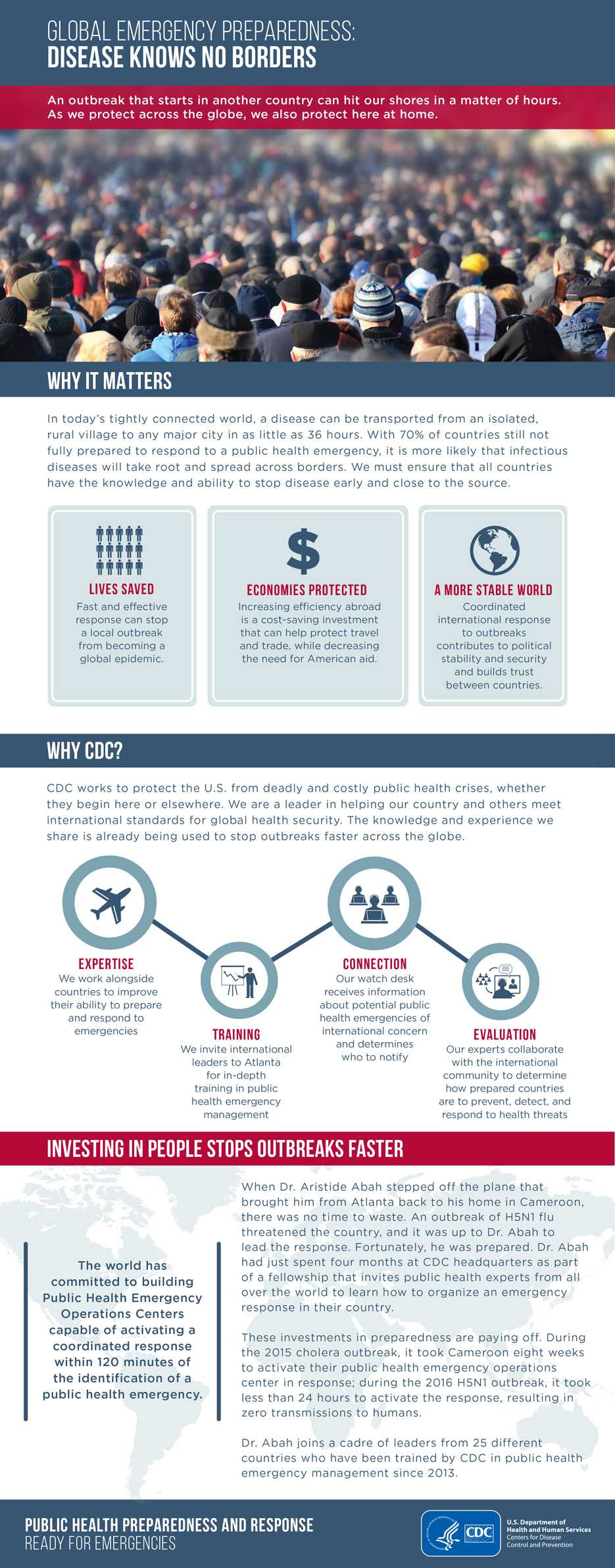Global Emergency Preparedness: Disease Knows No Borders
Text Equivalent
Global Emergency Preparedness: Disease Knows No Borders
An outbreak that starts in another country can hit our shores in a matter of hours. As we protect across the globe, we also protect here at home.
Why It Matters
In today’s tightly connected world, a disease can be transported from an isolated, rural village to any major city in as little as 36 hours. With 70% of countries still not fully prepared to respond to a public health emergency, it is more likely that infectious diseases will take root and spread across borders. We must ensure that all countries have the knowledge and ability to stop disease early and close to the source.
- Lives Saved: Fast and effective response can stop a local outbreak from becoming a global epidemic.
- Economies Protected: Increasing efficiency abroad is a cost-saving investment that can help protect travel and trade, while decreasing the need for American aid.
- A More Stable World: Coordinated international response to outbreaks contributes to political stability and security and builds trust between countries.
Why CDC?
CDC works to protect the U.S. from deadly and costly public health crises, whether they begin here or elsewhere. We are a leader in helping our country and others meet international standards for global health security. The knowledge and experience we share is already being used to stop outbreaks faster across the globe.
- Expertise: We work alongside countries to improve their ability to prepare and respond to emergencies
- Training: We invite international leaders to Atlanta for in-depth training in public health emergency management
- Connection: Our watch desk receives information about potential public health emergencies of international concern and determines who to notify
- Evaluation: Our experts collaborate with the international community to determine how prepared countries are to prevent, detect, and respond to health threats
Investing in People Stops Outbreaks Faster
When Dr. Aristide Abah stepped off the plane that brought him from Atlanta back to his home in Cameroon, there was no time to waste. An outbreak of H5N1 flu threatened the country, and it was up to Dr. Abah to lead the response. Fortunately, he was prepared. Dr. Abah had just spent four months at CDC headquarters as part of a fellowship that invites public health experts from all over the world to learn how to organize an emergency response in their country.
These investments in preparedness are paying off. During the 2015 cholera outbreak, it took Cameroon eight weeks to activate their public health emergency operations center in response; during the 2016 H5N1 outbreak, it took less than 24 hours to activate the response, resulting in zero transmissions to humans.
Dr. Abah joins a cadre of leaders from 25 different countries who have been trained by CDC in public health emergency management since 2013.
[TEXT BOX]
The world has committed to building Public Health Emergency Operations Centers capable of activating a coordinated response within 120 minutes of the identification of a public health emergency.
- Page last reviewed: February 6, 2017
- Page last updated: February 6, 2017
- Content source:


 ShareCompartir
ShareCompartir
